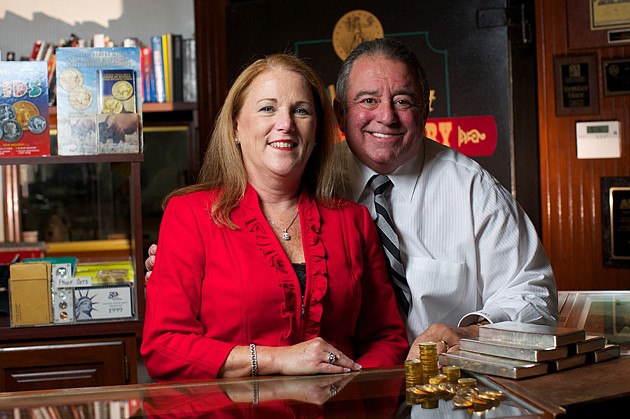- July 26, 2024
-
-
Loading

Loading

Michael Joyce is thinking about lending money, but he doesn't own a bank.
Joyce and his wife, Denise, are the owners of Gulfcoast Coin & Jewelry in Fort Myers. They've been in business for 38 years and do about $50 million in sales annually from their four locations in the area, mainly from buying and selling rare coins, gold and silver.
But like everyone else, Joyce has seen banks pull back since the downturn. He thinks he can fill a void. “The coin shops will be the new bankers,” he says. “We're about as close to banking as there is today.”
His idea is to create a high-security depository facility where customers can lock up and insure their valuable jewelry and coins. As an added service, Joyce says he's contemplating lending money based on the value of the precious metals.
For example, a customer may need an emergency loan and has $20,000 worth of jewelry in the depository. Joyce thinks there's a market for someone to lend that money at, say, 1% monthly interest with the jewelry as collateral.
“No bank would lend on two ounces of gold,” Joyce says. But there's an opportunity for him to make money that way, and he estimates he could house as much as $100 million worth of precious metals in the Fort Myers-Naples area. “You can liquidate that collateral easily,” he says.
Of course, his idea hasn't been well received in certain circles. “I talked to the banks about this and they laughed at me,” he says. “I don't know anyone who has this business model.”
To be sure, there are challenges. Joyce estimates it could cost as much as $300,000 to build a secure facility, and he'd have to set it up as a business separate from his coin and jewelry shops. To lend money, he might have to obtain a pawnshop license, which brings a new level of government regulation.
Creating a depository and lending would be a capital-intensive enterprise, Joyce acknowledges. “I would love to get investors,” he says.
But Joyce has been on the front line of the recent gold rush. “People are scared to death their paper money isn't going to be worth anything,” he says. Deficit spending by the government means the value of the dollar is less today. “It's not a Democrat or Republican thing,” he adds, blaming both sides for this state of affairs that nonetheless has benefited his trade.
Americans have never bought gold in the quantities they are now, Joyce says. Over the years, Joyce says most of the buyers and sellers of gold have been professional dealers. When he first got into the business in Tampa in the early 1970s, he traded with Vietnamese immigrants who flattened gold into sheets and tied them to their wives' thighs for safety.
That's because it's a speculators' market with thin profit margins because of the high overhead cost. Joyce enumerates the expenses: insurance, security, intense competition and protecting the value of his inventory by buying commodity hedge contracts.
Renting space in a depository and lending based on the value of the precious metals could be a more steady business that's less buffeted by the sharp ups and downs of the precious-metals markets. “I'm not a speculator,” Joyce says.